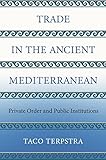Trade in the Ancient Mediterranean : Private Order and Public Institutions / Taco Terpstra.
Material type: TextSeries: The Princeton Economic History of the Western World ; 79Publisher: Princeton, NJ : Princeton University Press, [2019]Copyright date: ©2019Description: 1 online resource (296 p.) : 9 b/w illus. 6 mapsContent type:
TextSeries: The Princeton Economic History of the Western World ; 79Publisher: Princeton, NJ : Princeton University Press, [2019]Copyright date: ©2019Description: 1 online resource (296 p.) : 9 b/w illus. 6 mapsContent type: - 9780691172088
- 9780691189703
- 382.0937 23
- HF381
- online - DeGruyter
- Issued also in print.
| Item type | Current library | Call number | URL | Status | Notes | Barcode | |
|---|---|---|---|---|---|---|---|
 eBook
eBook
|
Biblioteca "Angelicum" Pont. Univ. S.Tommaso d'Aquino Nuvola online | online - DeGruyter (Browse shelf(Opens below)) | Online access | Not for loan (Accesso limitato) | Accesso per gli utenti autorizzati / Access for authorized users | (dgr)9780691189703 |
Browsing Biblioteca "Angelicum" Pont. Univ. S.Tommaso d'Aquino shelves, Shelving location: Nuvola online Close shelf browser (Hides shelf browser)

|

|

|

|

|

|

|
||
| online - DeGruyter Alien Oceans : The Search for Life in the Depths of Space / | online - DeGruyter Japanese Tales of Lafcadio Hearn / | online - DeGruyter Jewish Emancipation : A History across Five Centuries / | online - DeGruyter Trade in the Ancient Mediterranean : Private Order and Public Institutions / | online - DeGruyter The Way of Nature / | online - DeGruyter Classical Chinese (Supplement 4) : Selections from Philosophical Texts / | online - DeGruyter The Drama of Celebrity / |
Frontmatter -- Contents -- AKNOWLEDGEMENTS -- 1. Introduction -- 2. Public Institutions and Phoenician Trade -- 3. King's Men and the Stationary Bandit -- 4. Civic Order and Contract Enforcement -- 5. Economic Trust and Religious Violence -- 6. Epilogue -- 7. Concluding Remarks -- BIBLIOGRAPHY -- INDEX -- THE PRINCETON ECONOMIC HISTORY OF THE WESTERN WORLD -- A NOTE ON THE TYPE
restricted access online access with authorization star
http://purl.org/coar/access_right/c_16ec
How ancient Mediterranean trade thrived through state institutionsFrom around 700 BCE until the first centuries CE, the Mediterranean enjoyed steady economic growth through trade, reaching a level not to be regained until the early modern era. This process of growth coincided with a process of state formation, culminating in the largest state the ancient Mediterranean would ever know, the Roman Empire. Subsequent economic decline coincided with state disintegration. How are the two processes related?In Trade in the Ancient Mediterranean, Taco Terpstra investigates how the organizational structure of trade benefited from state institutions. Although enforcement typically depended on private actors, traders could utilize a public infrastructure, which included not only courts and legal frameworks but also socially cohesive ideologies. Terpstra details how business practices emerged that were based on private order, yet took advantage of public institutions.Focusing on the activity of both private and public economic actors-from Greek city councilors and Ptolemaic officials to long-distance traders and Roman magistrates and financiers-Terpstra illuminates the complex relationship between economic development and state structures in the ancient Mediterranean.
Issued also in print.
Mode of access: Internet via World Wide Web.
In English.
Description based on online resource; title from PDF title page (publisher's Web site, viewed 21. Jun 2021)


